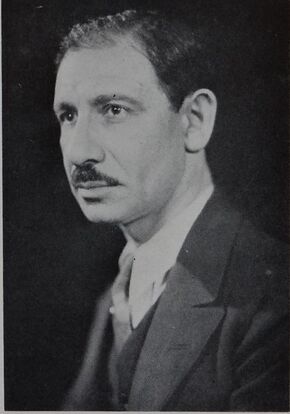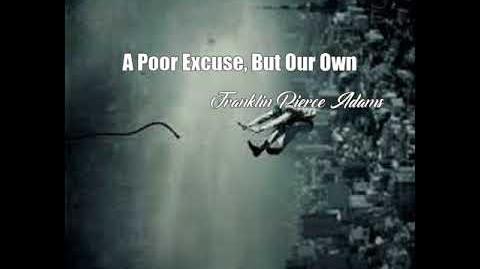
Franklin P. Adams (1881-1960), circa 1948. Courtesy Wikimedia Commons.
Franklin Pierce Adams (November 15, 1881 - March 23, 1960) was an American poet and columnist
Life[]
Overview[]
Adams, known by his initials FPA, and his wit, is best known for his newspaper column, "The Conning Tower", and his appearances as a regular panelist on radio's Information Please. A prolific writer of light verse, he was a member of the Algonquin Round Table of the 1920s and 1930s.
Youth and education[]
Adams was born Franklin Leopold Adams to Clara (Schlossberg) and Moses Adams in Chicago, Illinois, on November 15, 1881. He changed his middle name to "Pierce" when he was confirmed at age 13.[1] Adams graduated from the Armour Scientific Academy in 1899, attended the University of Michigan for a year, and worked in insurance for 3 years.
Columnist[]
Signing on with the Chicago Journal in 1903, he wrote a weather column and then a humor column, "A Little about Everything". The following year he moved to the New York Evening Mail, where he worked from 1904 to 1913 and began his column, then called "Always in Good Humor", which used readers' contributions. During his time on the Evening Mail, Adams wrote what remains his best known work, the poem "Baseball's Sad Lexicon," a tribute to the Chicago Cubs' double play combination of Joe Tinker, Johnny Evers, and Frank Chance.
In 1911, FPA added a 2nd column, a parody of Samuel Pepy's Diary, with notes drawn from his personal experiences. In 1914, he moved his column to the New York Tribune, where it was famously retitled "The Conning Tower."
During World War I, Adams was in the U.S. Army, serving in military intelligence and also writing a column, "The Listening Post", for the Army newspaper Stars and Stripes under editor Harold Ross. After the war, the so-called "comma-hunter of Park Row"[2] (for his knowledge of the language) returned to New York and the Tribune. He moved to the New York World in 1922, and his column appeared there until the paper merged with the inferior New York Telegram in 1931. He returned to his old paper, by then called the New York Herald Tribune, until 1937, and finally moved to the New York Post, where he ended his column in September 1941.
During its long run, "The Conning Tower" featured contributions from such writers as Robert Benchley, Edna Ferber, Moss Hart, George S. Kaufman, Edna St. Vincent Millay, John O'Hara, Dorothy Parker and Deems Taylor. Being published in "The Conning Tower" was enough to launch a career, as in the case of Dorothy Parker and James Thurber. Parker quipped, "He raised me from a couplet." Parker dedicated her 1936 publication of collected poems, Not So Deep as a Well, to F.P.A. Many of the poems in that collection were originally published in "The Conning Tower".
Much later, writer E.B. White freely admitted his sense of awe: "I used to walk quickly past the house in West 13th Street between Sixth and Seventh where F.P.A. lived, and the block seemed to tremble under my feet - the way Park Avenue trembles when a train leaves Grand Central."[3]
In the late 1940s, FPA was increasingly troubled by loss of memory and outbursts of temper (possibly the result of Alzheimer's disease). After his second divorce, he lived for a time in an apartment at the Players Club (facing Gramercy Park). Unable to care for himself, he was placed in the Lynwood nursing home on West 102nd Street, New York, where he died on March 23, 1960.[4]
Satires[]
FPA often included parodies in his column. His satire of Edgar Allan Poe's poem "Annabel Lee" was later collected in his book Something Else Again (1910):
- Soul Bride Oddly Dead in Queer Death Pact
- High-Born Kinsman Abducts Girl from Poet-Lover - Flu Said to Be Cause of Death - Grand Jury to Probe
- Annabel L. Poe of 1834-½ 3rd Ave., the beautiful young fiancee of Edmund Allyn Poe, a magazine writer from the South, was found dead early this morning on the beach off E. 8th Street. Poe seemed prostrated and, questioned by the police, said that one of her aristocratic relatives had taken her to the "seashore," but that the cold winds had given her "flu," from which she never "rallied." Detectives at work on the case believe, they say, that there was a suicide compact between the Poes and that Poe also intended to do away with himself. He refused to leave the spot where the woman's body had been found.
Radio[]
As a panelist on the radio's Information Please (1938-48), he was the designated expert on poetry, old barroom songs, and Gilbert and Sullivan, which he always referred to as Sullivan and Gilbert. A running joke on the show was that his stock answer for quotes that he didn't know was that Shakespeare was the author. (Perhaps that was a running gag: Information Please creator/producer Dan Golenpaul auditioned Adams for the job with a series of sample questions, starting with: "Who was the Merchant of Venice?" Adams: "Antonio." Golenpaul: "Most people would say 'Shylock.'" Adams: "Not in my circle.")[5]
A translator of Horace and other classical authors, F.P.A. also collaborated with O. Henry on Lo, a musical comedy.
Recognition[]
Today, Adams has been almost totally forgotten. All of his books are out of print.[4]
In popular culture[]
Adams was portrayed by actor Chip Zien in the 1994 film Mrs. Parker and the Vicious Circle.[6]
Quotes[]
- "I find that a great part of the information I have was acquired by looking up something and finding something else on the way."
- "To err is human; to forgive, infrequent."
- "Elections are won by men and women chiefly because most people vote against somebody rather than for somebody."
Publications[]
Poetry[]
- In Cupid's Court, Evanston, IL: Lord, 1902.
- Tobogganning on Parnassus, Garden City, NY: Doubleday, 1911.
- In Other Words. Garden City, NY: Doubleday Page, 1912.
- By and Large. Garden City, NY: Doubleday Page, 1914.
- Something Else Again. Garden City, NY: Doubleday Page, 1920.
- Christopher Columbus, and other patriotic verses, New York, NY: Viking, 1931.
- The Melancholy Lute: Selected songs of thirty years. New York: Viking, 1936.
Prose[]
- Weights and Measures. Doubleday, 1917.
- Us Mortals: Pictures and Legends. Boston & New York: Houghton Mifflin, 1917.
- Overset. Doubleday, 1922.
- Women I'm Not Married To (bound with Men I'm Not Married To, by Dorothy Parker). Doubleday, 1922.
- So There!. Doubleday, Page, 1923.
- So Much Velvet. Doubleday, 1924.
- Half a Loaf. Doubleday, 1927.
- The Column Book of F.P.A.. Doubleday, 1928.
- The Diary of Our Own Samuel Pepys, 1911-1934 (2 volumes), New York: Simon & Schuster, 1935.
- Nods and Becks, London & New York: McGraw-Hill, 1944.
Edited / contributed[]
- (Author of introductory essay) C.L. Edson, The Gentle Art of Columning: A Treatise on Comic Journalism. New York: Brentano, 1920.
- (Compiler with Deems Taylor, Jack Bechdolt, Helen Rowland, and Mabel Claire) The Book of Diversion, New York: Greenberg, 1925
- revised and enlarged edition compiled by Adams, Taylor, Rowland, and Percival Wilde published as The Weekend Companion, Cleveland & New York: World, 1941.
- (Contributor) The Book of Dilemmas, New York, NY: Simon and Schuster, 1931.
- (Editor) Berenice Dewey, Poems, New York, NY: Galleon Press, 1933.
- Percy Hammond: A Symposium in Tribute (with John Anderson, Brooks Atkinson, and others). Doubleday, 1936.
- (Author of foreword) Finley Peter Dunne, Mr. Dooley at His Best. New York: Scribners, 1938.
- Heywood Broun as He Seemed to Us (With John L. Lewis, Herbert Bayard Swope, and others). New York: Random House, 1940.
- (Author of introduction) William Congreve, Love for Love, New York: Scribners, 1940.
- (Editor) Innocent Merriment: An Anthology of Light Verse. New York: McGraw-Hill, 1942.
- (Compiler) The F.P.A. Book of Quotations, New York: Funk & Wagnalls, 1952.
Except where noted, bibliographical information courtesy the Poetry Foundation.[7]
Poems by Franklin Pierce Adams[]

A Poor Excuse, But Our Own (Franklin Pierce Adams Poem)
See also[]
- Eugene Field
- Edgar Guest
- Nick Kenny
- O.O. McIntyre
- List of U.S. poets
References[]
- ↑ Ashley, Sally. F.P.A.: The Life and Times of Franklin Pierce Adams. Beaufort, 1986. p. 25.
- ↑ Ashley, p. 13.
- ↑ White, E.B. Here Is New York. Harper & Bros., 1949. p. 32.
- ↑ 4.0 4.1 Michael Gilliland, "Biography of Franklin P. Adams," MGilleland.com, Web, Feb. 19, 2012.
- ↑ Ashley, p. 211.
- ↑ Full cast and crew for Mrs. Parker and the Vicious Circle (1994) at the Internet Movie Database
- ↑ Franklin Pierce Adams 1881-1960, Poetry Foundation, Web, Feb. 19, 2012.
External links[]
- Poems
- "The Rich Man"
- "Those Two Lads"
- Selected Poetry of Franklin Pierce Adams (1881-1960) - Biography & 8 poems (A Ballad of Baseball Burdens, Baseball's Sad Lexicon, Bricks and Straw, The Flat-Hunter's Way, Lines from a Plutocratic Poetaster to a Ditch-digger, A New York Child's Garden of Verses, A Psalm of Freudian Life, To the Returned Girls) at Representative Poetry Online
- Franklin Pierce Adams 1881-1960 at the Poetry Foundation
- Franklin P. Adams at Poets' Corner
- Franklin P. Adams at PoemHunter (82 poems)
- Books
- Works by Franklin P. Adams at Project Gutenberg
- Works by Franklin Pierce Adams at the Internet Archive
- About
| This page uses Creative Commons Licensed content from Wikipedia. (view article). (view authors). |
| This page uses content from Wikinfo . The original article was at Wikinfo:Franklin P. Adams. The list of authors can be seen in the (view authors). page history. The text of this Wikinfo article is available under the GNU Free Documentation License and the Creative Commons Attribution-Share Alike 3.0 license. |
|